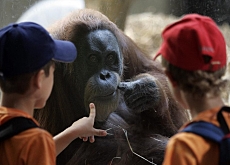Swiss drag knuckles accepting evolution

One in three Swiss thinks it is "definitely false" that humans developed from earlier species of animals, according to an international survey on evolution.
How seriously should we take the news that only Austria is less enlightened among “old” European countries? Is it simply a reflection of Switzerland’s religious history and dislike of change – or a serious failure of the education system?
The journal Science recently published a survey by Jon Miller at Michigan State University which put the following statement to more than 34,000 people in 32 European countries, the United States and Japan: “Human beings, as we know them, developed from earlier species of animals.”
In Iceland, Denmark, Sweden, and France, 80 per cent or more of adults said this was “definitely true”, as did 78 per cent of Japanese adults. Only Turkey (25 per cent) saved the United States’ (40 per cent) blushes.
Sixty per cent of the 1,000 Swiss respondents agreed with the statement – putting them in 22nd position – 10 per cent were not sure and 30 per cent said it was “definitely false”.
“Thirty per cent is disturbingly high,” Sebastian Bonhoeffer, professor of theoretical biology at the Federal Institute of Technology in Zurich, told swissinfo.
“It disturbs me for professional reasons, but what really disturbs me is something deeper that doesn’t necessarily have anything to do with evolution. It is that people are obviously willing to believe things rather than critically assess evidence and look behind arguments – this eventually applies not only to science but also to other issues in society.”
Indeed Switzerland’s system of direct democracy is especially vulnerable to an inability to separate fact from fiction.
When Swiss voters approved a five-year ban on genetically modified organisms at the end of last year, Klaus Ammann from the Committee against a Gentech Moratorium and director of Bern’s Botanical Gardens told swissinfo: “The pro-people had a very easy game to come with all sorts of pseudo-facts and half-truths because the population was ready to believe it.”
Not good for democracy
Rolf Strasser, a Christian journalist focusing on the sociology of religion, also says many Swiss struggle with scientific evidence.
“For many of [the 30 per cent] the mainstream thinking of evolution is not convincing enough, because ideology and science are mixed too much, especially in the writings of so-called scientific journalism and school books,” he told swissinfo.
“A better understanding of science is good for tolerance, but the scientific community should communicate better what is real science and what is hypothesis. Blind faith in religious or non-religious beliefs is not good for democracy.”
During a national vote on embryo stem cell research a couple of years ago, Interior Minister Pascal Couchepin, who is responsible for education (and who supported the research), said: “God gave us intelligence in order to use it and to understand nature.”
It’s hard to measure how many of the two-thirds of voters who eventually backed the research thought likewise, but it’s equally hard to imagine a French or British education minister making comments like that.

More
Direct democracy
Intellectual independence
For Bonhoeffer it’s not so much a question of science versus religion but rather of being able to make up one’s own mind based on the evidence.
“I don’t want to blame the Swiss in particular here, but I think [the survey] does reflect bad education,” he said.
“There’s certainly a community who cannot be convinced [of evolution], but I think there is also a large community who could be convinced if they were taught how to assess evidence.
“We should not teach people that this is how the world works, believe it! We should teach them how to deal with evidence and how to critically assess different hypotheses. If we teach them this well – and in a way that is not dogmatic – they will come to the conclusion that there is overwhelming evidence that we did indeed derive from other animals.”
swissinfo, Thomas Stephens
The Federal Constitution lays down the right to education and the obligation to attend school, but cantons are permitted to take their own independent decisions when it comes to the structure of their education systems, syllabuses and the dates of school holidays.
This means there are currently 26 differing education systems in Switzerland, although the system is set to be harmonised.
The Swiss Conference of Cantonal Ministers of Education told swissinfo that the issue of pupils not accepting evolution has never come up for discussion as part of intercantonal coordination.
All living organisms – from humans to mountain goats to edelweiss – are distant cousins and have evolved, through genetic mutations and the process of natural selection, from a single self-replicating molecule that popped into existence by chemical chance some 3.5 billion years ago.
Natural selection is the non-random process by which organisms with favourable traits survive and reproduce more than rivals, thus genes that build successful survival machines get passed on more than less successful genes.
Evolution via natural selection thus explains how simple organisms can, over millions of years, result in complex organisms seemingly designed for their environment without requiring any supernatural “designer”.
The evidence for evolution is overwhelming – not just in biology and geology, but also physics and cosmology.

In compliance with the JTI standards
More: SWI swissinfo.ch certified by the Journalism Trust Initiative












You can find an overview of ongoing debates with our journalists here . Please join us!
If you want to start a conversation about a topic raised in this article or want to report factual errors, email us at english@swissinfo.ch.